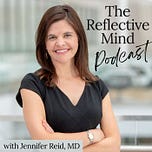Finally, new prospects in depression treatment! Listen in as Dr. Jennifer Reid and Dr. Michael Thase discuss antidepressants, ketamine, psychedelics, and much more!
Professor Thase is renowned as a teacher, mentor, administrator, researcher and clinician. One of the world’s most highly cited psychiatrists, he has more than 1300 publications, as well as 18 books, including the award-winning Learning Cognitive Therapy, now in its second edition.
Dr. Michael Thase is a Professor of Psychiatry in the Perelman School of Medicine of the University of Pennsylvania, and a member of the medical and research staff of the Corporal Michael J Crescenz Veterans Affairs Medical Center:
Some questions Dr. Thase considers:
1) You have been treating patients with depression for decades. How would you describe how your work has changed since you first started your career?
2) Looking back, do you think there were any missed opportunities when it comes to depression treatment?
3) How do you conceptualize difficult-to-treat depression, and is this something you discuss with patients?
4) You’re coauthor on a paper titled “The Neglected Role of Psychotherapy for Treatment-Resistant Depression.” What is its role?
7) What are your opinions about ketamine treatment in its various formulations: IV, sublingual, Esketamine?
8) What about psychedelics? Cannabis?
9) What are you hopeful about in the field of psychiatry?
A 1979 graduate of The Ohio State University College Medicine, Professor Thase completed internship, residency, chief residency, and post-doctoral training in clinical research at the University of Pittsburgh Medical Center (UPMC), where he rose to the rank of Professor of Psychiatry and was Chief of the Division of Academic Adult Psychiatry until 2007, when he moved to Philadelphia.
He is a Distinguished Life Fellow of the American Psychiatric Association, a Fellow of the American College of Neuropsychopharmacology and a member of the American College of Psychiatrists. He is a Past President of the American Society of Clinical Psychopharmacology, for which he was a member of their Board of Directors for more than two decades.
A Founding Fellow of the Academy of Cognitive Therapy, Professor Thase is a member of advisory boards for the Anxiety and Depressive Disorders Association, the National Network of Depression Centers, the Depression and Bipolar Support Alliance and the American Foundation for Suicide Prevention. In 2018 he was elected to the membership of Penn Medicine’s Academy of Master Clinicians, an honor bestowed to only 2% of the medical school’s faculty. Professor Thase’s research has been continuously funded by various federal agencies for the past 37 years and currently focuses on novel therapies for difficult to treat depressive disorders and dissemination and implementation of cost-effective forms of cognitive behavior therapy.
Jennifer Reid, MD on Instagram: @JenReidMD
Looking for more from The Reflective Doc? Subscribe today so you don't miss out!
Also check out Dr. Reid's regular contributions to Psychology Today: Think Like a Shrink
**********************
Seeking a mental health provider? Try Psychology Today
National Suicide Prevention Lifeline: 1-800-273-8255
Dial 988 for mental health crisis support
SAMHSA's National Helpline - 1-800-662-HELP (4357)
-a free, confidential, 24/7, 365-day-a-year treatment referral and information service (in English and Spanish) for individuals and families facing mental and/or substance use disorders.
Disclaimer:
The views expressed on this podcast reflect the host and guests, and are not associated with any organization or academic site.
The information and other content provided on this podcast or in any linked materials, are not intended and should not be construed as medical advice, nor is the information a substitute for professional medical expertise or treatment. All content, including text, graphics, images and information, contained on or available through this website is for general information purposes only.
If you or any other person has a medical concern, you should consult with your health care provider or seek other professional medical treatment. Never disregard professional medical advice or delay in seeking it because of something that have read on this website, blog or in any linked materials. If you think you may have a medical emergency, call your doctor or emergency services (911) immediately. You can also access the National Suicide Help Line at 1-800-273-8255















Share this post